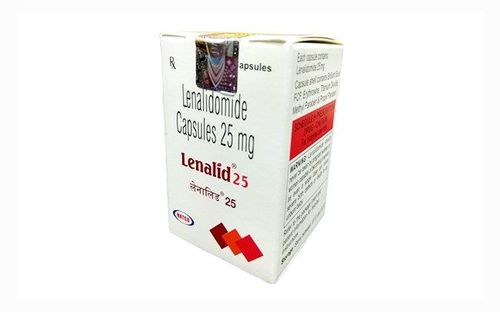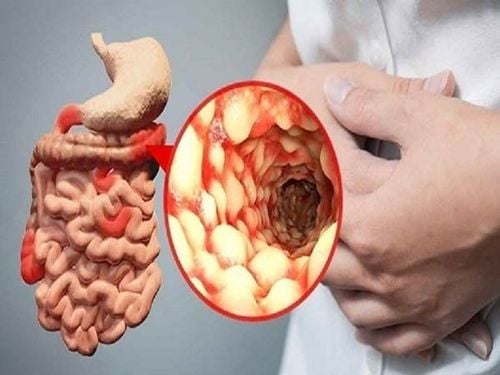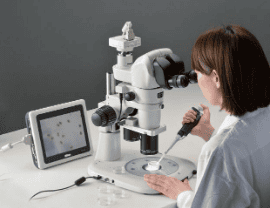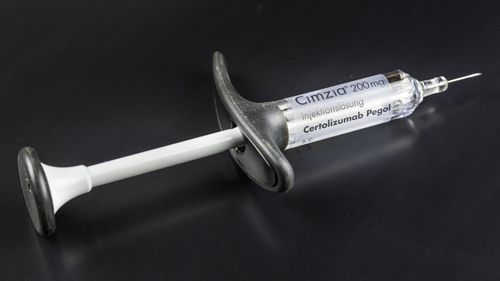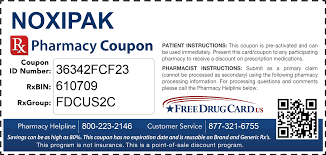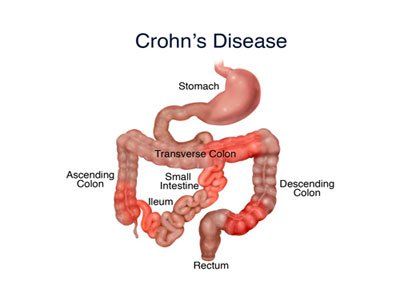This is an automatically translated article.
Posted by Doctor Mai Vien Phuong - Department of Medical Examination & Internal Medicine - Vinmec Central Park International General Hospital
The group of Crohn's patients is assessed at high risk when the CDAI score is between 220-450, does not respond to treatment like the low-risk group, often has high fever, weight loss, abdominal pain, vomiting, and nausea (no evidence). intestinal obstruction), severe anemia. The lesions on endoscopy range from moderate to severe.
1. Corticosteroid drugs
Patients with more severe symptoms, high-risk progression and complications will need more aggressive treatment. Traditional corticosteroids such as prednisone or methylprednisone can be used orally or, when the disease is advanced and acute, intravenously for rapid control of symptoms. However, the use of corticosteroids even for a short period of time still has undesirable effects such as changes in emotional status, osteoporosis, insomnia, increased blood pressure, increased blood sugar, weight gain, glaucoma, adrenal insufficiency. .
The dose used to treat active Crohn's disease is equivalent to 40 - 60 mg of prednisone/day. A dose of 1mg/kg/day can be used for 1-2 weeks, then gradually reduced to 5mg/week and the dose reduction process does not exceed 3 months. The use of doses higher than 60mg rednisone/day is not recommended. The downside of steroid use is that nearly 20% of patients do not experience remission and a third of patients develop steroid dependence making dose reduction difficult. In addition, patients with complications such as perforation or abscess are not indicated for steroids.
2. Immunosuppressive drugs
Immunosuppressive drugs that have been studied and are being used in Crohn's patients include azathioprine, 6-mercaptopurine, and methotrexate as immunomodulatory bridging therapy for biologic therapy. .
In patients with moderate to severe Crohn's disease who are still symptomatic despite previous or current corticosteroid use, thiopurine preparations (azathioprine at a maximum dose of 1.5 to 2.5 mg/kg) may be used. /day or 6-mercaptopurine at a maximum dose of 0.75 - 1.5 mg/kg/day) or use methotrexate at a dose of 15 - 25 mg IM/subcutaneously weekly.
It should be noted that although methotrexate is effective, it is necessary for women of childbearing age to avoid pregnancy. These drugs have a slow effect of about 8-9 weeks, so they are not used to induce a rapid response to symptoms, but are mainly considered as "bridge" therapy and maintenance of symptom relief. Attention should be paid to some undesirable effects of thiopurine and methotrexate groups such as allergies, pancreatitis, bone marrow suppression, nausea, infection, hepatotoxicity, the risk of forming malignant lesions such as skin cancer, lymphoma. During treatment with these drugs, blood counts and biochemical tests should be periodically monitored for early detection of undesirable effects. Some other immunomodulatory drugs such as cyclosporine, tacrolimus, mycophenolate mofetil have not been shown to be effective in the treatment of active Crohn's disease.
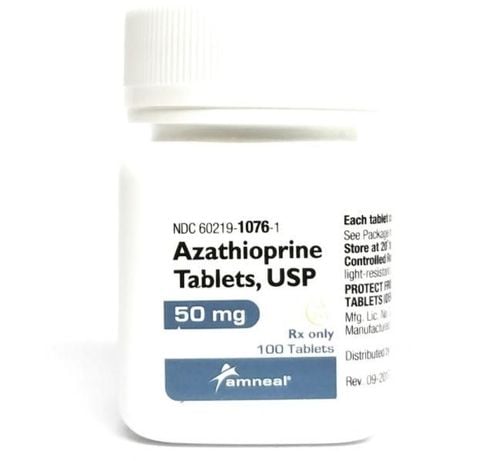
3. Anti-INE drug group
As recommended by the American Gastroenterology Association in 2018, anti-IN drugs: including infliximab, adalimunab, certolizumab pegol should be used for Crohn's patients who are resistant to corticosteroids, thiopurine or methotrexate. Infliximab is also approved for use in patients with fistula complications who have failed conventional medical therapy.
The combination of infiximab with immunomodulatory drugs such as thiopurine will be more effective in reducing symptoms, maintaining remission and healing intestinal mucosal damage than using each drug group alone in patients with Patients who have never been treated with either of these classes of drugs. The combination of antibodies such as adalimumab or certolizumab pegol with immunomodulatory drugs has not been well studied but is encouraged because the use of immunomodulators will help prevent the formation of antibodies to the immunomodulatory drug. biological products. These monoclonal antibodies have been shown to be effective in inducing symptomatic remission as well as in ameliorating mucosal lesions in patients with Crohn's disease rapidly, usually within 2 weeks. In addition, early indications also help to improve the response rate and maintain remission within 2 years from onset as well as reduce the progression of recurrence after surgery.
Before using probiotics, it is necessary to carefully weigh the benefits and risks for each patient, especially in high-risk groups such as a history of demyelinating diseases (neuritis). amenorrhea, diffuse fibrosis), heart failure, lymphoma, or other malignancies. In addition, latent TB should be excluded before treatment as well as the status of hepatitis virus infection. If there is no hepatitis B virus, it is necessary to vaccinate the patient. In the case of patients with hepatitis B, before and during treatment with biologics or immunomodulators, antiviral drugs should be treated to prevent hepatitis B virus outbreaks causing liver failure. Some vaccines should also be vaccinated before treatment such as pneumococcal vaccine, inactivated influenza, hepatitis A virus, Herpes..., however, care should be taken to avoid live attenuated vaccines while in use. immunosuppressive drug use.
4. Drugs affecting leukocyte chemotaxis
Inhibitors of leukocyte chemotaxis have already begun to be used in Crohn's patients, Natalizumab, an anti-integrin a4 antibody that inhibits leukocyte chemotaxis in the whole body, has demonstrated more effective than pharmaceuticals in achieving therapeutic response and maintaining remission in patients with active Crohn's disease. However, when treating with this antibody, attention should be paid to the risk of progression of progressive multifocal leukoencephalopathy due to John Cunningham virus (JC). This pathology may occur in 1% of JC-antibody-positive patients receiving immunosuppressive agents. Therefore, Natalizumab should not be used in the group of patients with positive antibodies to JC virus. It is necessary to check for antibodies to this virus before treatment as well as every 6 months during follow-up. Specific effects on intestinal leukocyte chemotaxis are used Meanwhile, Vedolizumab, a selective inhibitory antibody (34B7 integrin for moderate to severe Crohn's disease is reduced/no longer present). respond to anti-TNF or immunomodulatory drugs.It can be combined with immunomodulatory drugs or used alone to achieve symptom relief without the need for additional corticosteroids. Patients who have been treated with anti-TNF drugs often have a slower response (week 10) compared to treatment-naive patients (week 6).Vedolizumab dose is 300mg IV at week 0.2,6 then maintain a dose of 300 mg intravenously every 8 weeks,
5. Drugs that act on IL-12/23 (anti-p40 antibodies)
Ustekinumab is a new, anti-p-40 antibody that inhibits IL-12, 23 and is effective for Crohn's patients who have failed treatment and corticosteroids, thiopurine, methotrexate or anti-biological preparations - TNF. The advantage of this drug is that it is safe, does not increase the risk of infection and the development of malignancies.
However, until there are comparative studies comparing the effectiveness of Utensurpass with e i7, or anti-TNF group, so the choice of rhoff (Rich Probiotics, each specific patient subject must be based on the Implants) sure the benefits and risks. For severe and fulminant patients, intravenous corticosteroids should be used at a dose of 40-60cng/day or consider and use biological drugs such as anti-TNT group. Before using Inflizíria, it is possible to use a bolus corticosteroid injection to prevent the formation of antibodies against TCT Biologics in fulminant cases, InflizIrnab can be used, The high efficacy of adalimumab and certolizumab in this group of patients so far is still ongoing. It's really obvious, so it's not specifically recommended.
Vinmec International General Hospital is a prestigious address trusted by many patients in performing diagnostic techniques for digestive diseases, diseases that cause chronic diarrhea, Crohn's disease... Along with that, at Vinmec Hospital, screening for gastric cancer and gastric polyps is done through gastroscopy with Olympus CV 190 endoscope, with NBI (Narrow Banding Imaging) function for The imaging results of mucosal pathology analysis are clearer than conventional endoscopy, detecting ulcerative colitis lesions, early gastrointestinal cancer lesions... Vinmec Hospital with facilities Quality and modern equipment and a team of experienced experts, always dedicated to medical examination and treatment, customers can rest assured with gastroscopy and esophagogastroduodenoscopy at Vinmec International General Hospital. .
Please dial HOTLINE for more information or register for an appointment HERE. Download MyVinmec app to make appointments faster and to manage your bookings easily.
References
Dao Van Long, Dao Viet Hang. Autoimmune allergic disease of the gastrointestinal tract. Medical Publisher. Bernstein C. N. and Shanahan F. (2008). Disorders of a modern lifestyle: reconciling the epidemiology of inflammatory bowel diseases. Gut,57(9), 1185 - 1191. Nell S., Suerbaum S., and Josenhans C. (2010). The impact of the microbiota on the pathogenesis of IBD: lessons from mouse infection models. Nat Rev Microbiol, 8(8),564-577. Binder V. (1998). Genetic epidemiology in inflammatory bowel disease. Dig Dis Basel Switz, 16(6), 351-355. Montgomery S. M., Morris D. L., Pounder R. E. et al (1999). Asian ethnic origin and the risk of inflammatory bowel disease. Eur J Gastroenterol Hepatol, 11(5),543-546.





